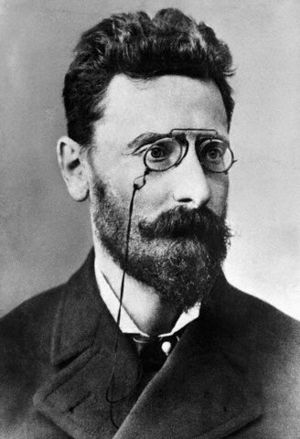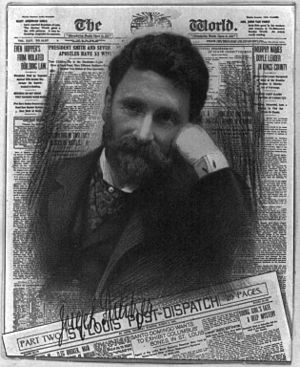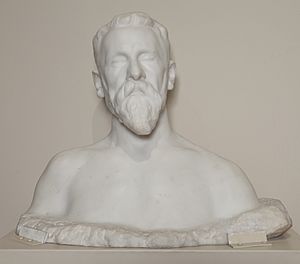Joseph Pulitzer facts for kids
Quick facts for kids
Joseph Pulitzer
|
|
|---|---|
 |
|
| Member of the U.S. House of Representatives from New York's 9th district |
|
| In office March 4, 1885 – April 10, 1886 |
|
| Preceded by | John Hardy |
| Succeeded by | Samuel Cox |
| Personal details | |
| Born |
József Pulitzer
April 10, 1847 Makó, Kingdom of Hungary, Austrian Empire |
| Died | October 29, 1911 (aged 64) Charleston, South Carolina, United States |
| Political party | Democratic |
| Spouses | Katherine "Kate" Davis (1878–1911; his death; 7 children) |
| Occupation | Publisher, philanthropist, journalist, lawyer |
| Net worth | USD $30.6 million at the time of his death (approximately 1/1142nd of US GNP) |
| Signature | |
| Military service | |
| Allegiance | United States of America |
| Branch/service | Union Army |
| Years of service | 1864–1865 |
| Unit | First Regiment, New York Cavalry |
| Battles/wars | American Civil War |
Joseph Pulitzer (born József Pulitzer; April 10, 1847 – October 29, 1911) was a very important newspaper publisher. He owned the St. Louis Post-Dispatch and the New York World newspapers. He became a well-known figure in the Democratic Party and was elected to the U.S. Congress from New York.
Pulitzer fought against big businesses and corruption. He also played a key role in keeping the Statue of Liberty in New York City.
In the 1890s, his newspaper, the World, competed fiercely with William Randolph Hearst's New York Journal. This competition led both newspapers to use a style called "yellow journalism". This meant they used exciting stories, crime news, and dramatic pictures to attract many readers.
This style helped newspapers reach huge numbers of people, sometimes selling a million copies a day! These newspapers made money from advertising, not just from selling copies. They offered readers a mix of news, gossip, fun stories, and ads.
Today, Joseph Pulitzer is most famous for the Pulitzer Prizes. These awards started in 1917 because of money he left to Columbia University. The prizes are given every year to celebrate excellent work in American journalism, photography, books, history, poetry, music, and plays. Pulitzer also helped create the Columbia School of Journalism with his generous gift. It opened in 1912.
Contents
Early Life and Challenges
Joseph Pulitzer was born József Pulitzer in Makó, Hungary, on April 10, 1847. His family was Jewish and known for being merchants. His father, Fülöp Pulitzer, was a respected businessman.
In 1853, his father retired, and the family moved to Pest (now part of Budapest). Joseph and his siblings were taught by private tutors and learned French and German. Sadly, his father died in 1858, and the family lost their money. Joseph tried to join different armies in Europe to find work before he moved to the United States.
Serving in the Civil War
Pulitzer wanted to join the military but was turned down by the Austrian, French, and British armies. Finally, in August 1864, he was recruited in Germany to fight for the Union in the American Civil War. He was 17 years old and couldn't speak English when he arrived in Boston.
He joined the 1st New York Cavalry Regiment in September 1864. His unit was mostly made up of German immigrants, so he didn't learn much English during the war. He fought in the Appomattox Campaign and left the army in June 1865.
Starting a Career in St. Louis
After the war, Pulitzer tried working in the whaling industry in Massachusetts, but he found it boring. He returned to New York with no money and even slept in wagons. He decided to travel to St. Louis, Missouri, by riding in a freight train car. He sold his only valuable item, a handkerchief, for 75 cents.
When he arrived in St. Louis, he felt hopeful. Many people in the city spoke German, so his German language skills were very helpful. He worked as a waiter and spent his free time at the St. Louis Mercantile Library. There, he studied English and read many books.
In 1868, Pulitzer became a lawyer. However, his English was still not perfect, and he looked a bit unusual, so he didn't get many clients. That same year, he was offered a job as a reporter for the Westliche Post, a German-language newspaper. This was his start in journalism.
Becoming a Newspaper Owner
On December 9, 1878, Joseph Pulitzer bought a struggling newspaper called the St. Louis Dispatch. He combined it with another paper, the St. Louis Post, to create the St. Louis Post and Dispatch on December 12. Soon, it was just called the Post-Dispatch.
With his own newspaper, Pulitzer became a champion for everyday people. He published stories that exposed corruption and took a strong stand for what he believed in. His paper became known for its exciting and sometimes shocking news stories.
The Post-Dispatch became very popular. When Pulitzer first bought it, the two papers together sold fewer than 4,000 copies. By the end of 1879, sales were up to nearly 5,000. By September 1882, they sold over 22,000 copies! Pulitzer bought new printing presses and paid his staff the highest wages in the city.
Taking Over the New York World
By 1883, Pulitzer had become very wealthy. That year, he bought The New York World newspaper. This paper was losing a lot of money, but Pulitzer paid $346,000 for it. He changed the newspaper's focus to include human-interest stories, scandals, and exciting news.
In 1885, he was elected to the U.S. House of Representatives. However, he resigned after only a few months because he didn't enjoy politics. In 1887, he hired the famous investigative journalist Nellie Bly. In 1895, the World introduced the popular Yellow Kid comic strip. This was the first newspaper comic printed in color. Under Pulitzer's leadership, the New York World's sales grew from 15,000 to 600,000 copies, making it the biggest newspaper in the country.
A School for Journalists
In 1892, Pulitzer offered money to Columbia University to start the world's first school of journalism. The university first said no to his offer. In 1902, Columbia's new president, Nicholas Murray Butler, was more open to the idea of a school and prizes.
Pulitzer left $2 million to the university in his will. This led to the creation of the Columbia University Graduate School of Journalism in 1912, after his death. Today, Columbia's Graduate School of Journalism is one of the most respected in the world.
Death
In 1911, Joseph Pulitzer was traveling on his yacht to his winter home in Georgia. His yacht stopped in Charleston Harbor, South Carolina. On October 29, 1911, Pulitzer was listening to his German secretary read a story about King Louis XI of France. As the secretary finished, Pulitzer said in German, "Leise, ganz leise" (which means "Softly, quite softly"), and then he passed away. His body was brought back to New York and buried in Woodlawn Cemetery in The Bronx.
Pulitzer Prize Awards
In 1917, Columbia University began giving out the first Pulitzer Prizes for journalism. Over time, these awards grew to also recognize great achievements in literature, poetry, history, music, and drama.
Legacy and Honors
- The U.S. Post Office released a stamp honoring Joseph Pulitzer in 1947. This was 100 years after he was born.
- The Pulitzer Arts Foundation in Saint Louis was created by his family's generous donations and is named after them.
- In 1989, Joseph Pulitzer was added to the St. Louis Walk of Fame.
- He is shown as a character in the Disney movie Newsies (1992) and the Broadway musical Newsies (2011).
- Mount Pulitzer in Washington state is named after him.
Images for kids
-
"Liberty Enlightening the World, or The Statue of Liberty," a stained glass window commissioned by Pulitzer to commemorate the New York World's fundraising for the pedestal of the Statue of Liberty. Originally installed in the New York World Building, it was moved to Pulitzer Hall at Columbia University.
See also
 In Spanish: Joseph Pulitzer para niños
In Spanish: Joseph Pulitzer para niños






